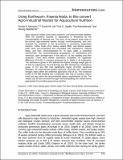Using Earthworm, Eisenia fetida, to Bio-convert Agro-industrial Wastes for Aquaculture Nutrition

View/
Publication Date
2020Author
Musyoka, Sonnaia N
Liti, David M
Erick, Ogello O
Meulenbroek, Paul
Waidbacher, Herwig
Metadata
Show full item recordAbstract/
Agro-industrial waster pose great economic and evironmental hazards, while the economic success of aquaculture is a threatened bu the unsustainabiloity o fishmeal use.
The aim of the present study were to bio-convert agro-industrial waste through vermicomposing, and then evaluate the potential of the by-products in promoting aquacutlture nutrion.
Coffee husks (CH), barley wastes (BW), and kitchen wastes (KW) were pre-composed and inoculated with earthworms, Elsenia fetida, and then vermicomposing for 7o days under a controlled environment.
The Vermicomposting by-products, i.e earthworms and vermicast, were emalgamated in the ration of 1:5 into bedding and them analysed. There were neither earthworm mortalities nor significant difference (p>0.05) in cocoons prouced by E. Fetida in all treatments.
The earthworms grown in KW attained the highest averag weight gain of 27.8+-0.7g, followed by CH( 24.9+-0.6g) and BW (24.8 +-0.7g).
Earthworms grown in CH and BW had significantly higher (p<0.05) nutritional attributes. All experimental wastes produced vermicast with carbo and nitrogen ratios within the preffered agromomics limit of 20.
The nutriotional profile of the BW bedding was comparable with that of Caridina nilotica meal and was within the recommended dietary requirements of fish. The wastes can be bio-converted through vermicomposting into various forms appropriate for providing acquaculture nutrition.
